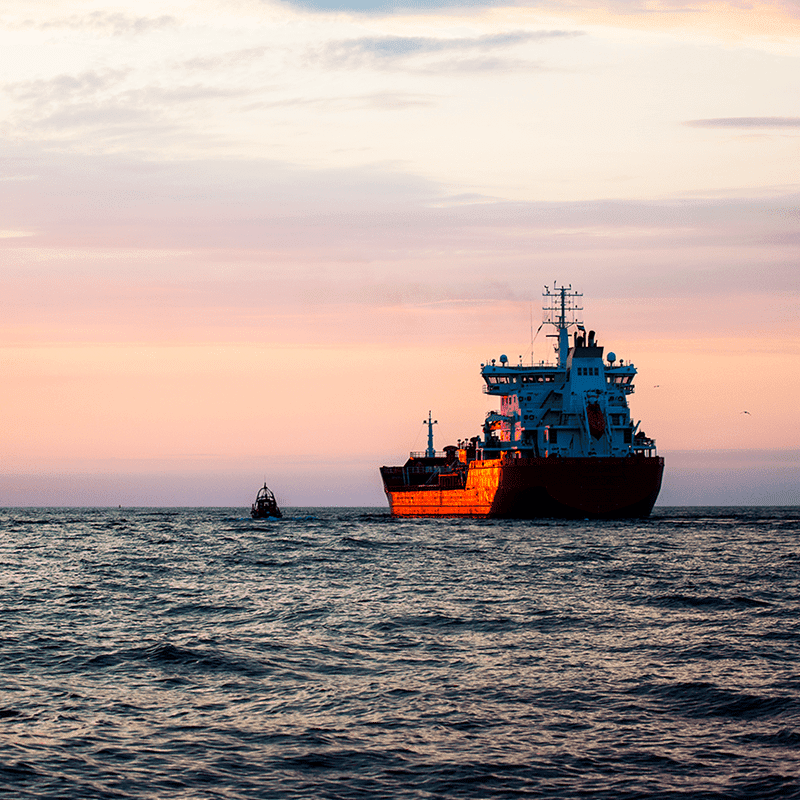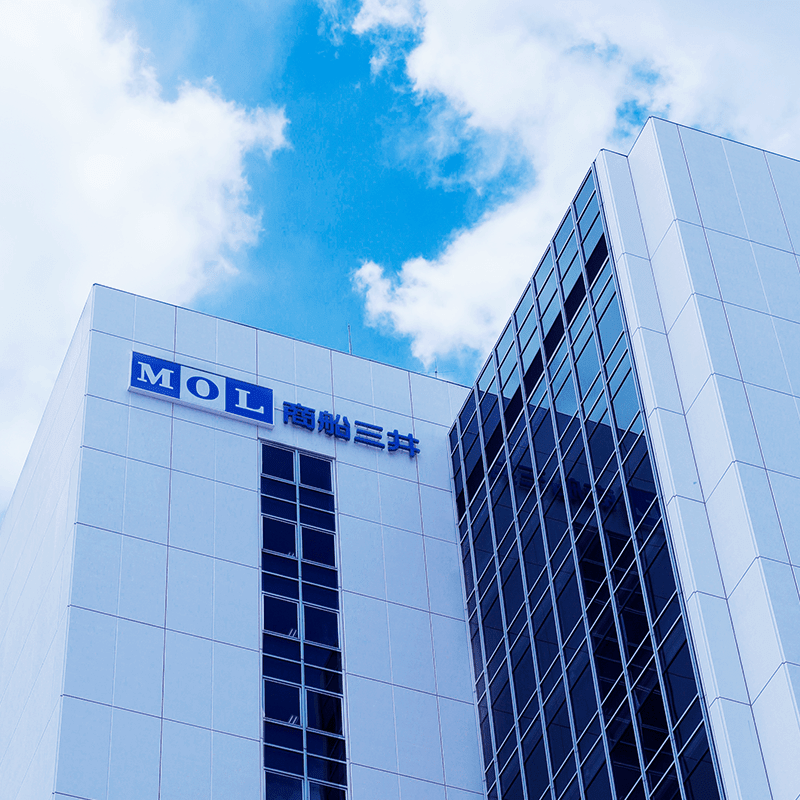- Japanese
-
- A
- A
- A
BLOG
Now in Turkey ~Interview with MOL Turkey~
- General Shipping
2022.06.21
Ask a representative in Turkey about Turkey today
The lira’s collapse since the end of last year was briefly mitigated by the government's exchange rate measures at the beginning of the year, but has since returned to falling significantly as the lira continues to be sold off, mainly due to the implementation of the United States inflationary measures by raising interest rates. The impact of Russia's invasion of Ukraine and high resource prices has made Turkey accelerated significant inflation, with consumer prices rising to 70.0% year-on-year. For example, there was an across-the-board 40% increase on 9 April for major transportation services such as subways, buses, and taxis in Istanbul, the largest city in Turkey. So, a fare of 200 yen rose to 280 yen, which has had a significant impact on people's lives.
While central banks around the world are taking preventive measures by raising interest rates in response to global inflation, in Turkey, political intervention by President Erdoğan has led to a policy of interest rate cuts, which has resulted in significant inflation and continued depreciation of the lira. Public discontent is growing, and the President's approval rating is declining. There is a strong possibility that the opposition coalition will win the presidential elections scheduled for June 2023, possibly replacing Erdoğan's nearly 20-year-long government. If the opposition wins, constitutional reforms are also likely to proceed, accelerating moves to reduce the powers of the previously powerful president and a return to the previous parliamentary system.
In addition, Turkey is also going through a period of political and economic upheaval, with a significant drop in the tourism sector, a key industry, due to the impact of COVID-19 and the spill-over effects of the war between neighbouring Russia and the Ukraine. How are the staff working at the MOL Turkish subsidiary dealing with the current situation? And how are they going to build future business opportunities? We interviewed Mr. Satoshi Katada, the country representative of Turkey, and Mr. Yosuke Yamada, a senior staff member in charge of Turkey in the Corporate Marketing Division at the Tokyo Head Office.
MOL Initiatives and Achievements in Turkey-
ーーFirst of all, please tell us about your current specific efforts in Turkey.
Katada
-
I think our job here is to help the people of Turkey to get to know MOL and for MOL to get to know about Tukey and find, invest, and grow new businesses in Turkey. I am not only in charge of Turkey, but also in charge of countries along the eastern Mediterranean coast (Egypt, Greece, Lebanon, Israel, Cyprus, and Jordan) and the Black Sea coastal countries (Ukraine, Romania, Bulgaria, and Georgia). I am involved in all aspects of our operations, defying divisional boundaries.
Five years have already passed since I was first stationed here, and I feel that I have been able to promote ourselves and build a network with local companies, and through being in touch from local companies or face-to-face meetings grow our presence. However, we must continue to make our presence known in such a way that people immediately think of the MOL Group when searching for logistical solutions and we must further strengthen our relationships with customers, partners, and government agencies to expand our business activities. The information drawn from such relationships is invaluable, if we are to provide appealing proposals. We are working to build these relationships to develop businesses that are closely tied to local industries and communities, and to create a structure that will generate profits in the region while increasing the attractiveness of our company.
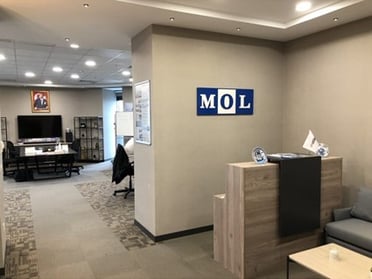
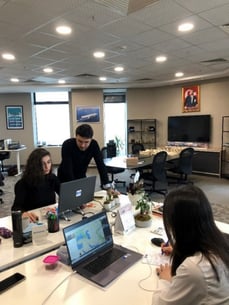
MOL Turkey office: Total of 7 employees, including representative and local staff.
ーーWhat are some of the achievements you have already reached?
Katada
- Regarding the shipping business, the company transports automobiles, trucks, construction machinery, and trailers by car carrier, and also transports iron ore for major steel companies between Europe and Turkey. We have also started a logistics business with a focus on land transport to and from Europe. Toyota and many Western manufacturers produce automobiles in Turkey. TOGG, a domestic car manufacturer, is preparing to start production with the strong support of the state and the local business community. Automobile-related businesses will continue to be important in the future.
Yamada
- In the energy sector, we have also been providing solutions that use FSRUs (Floating Storage and Regasification Units) to store and regasify LNG (liquefied natural gas) transported from other countries by sea and delivered to the shore through pipelines. The advantages of FSRUs are the much lower cost and shorter delivery time compared to onshore facilities. Based on our experience in Turkey, we plan to start similar operations in Hong Kong, Indonesia, and other countries.
- FSRU Provided by MOL
- In addition, we are developing offshore LNG power generation businesses in Mozambique, Senegal and other countries under the “KARMOL” brand in a joint project with the Turkish conglomerate “Karadeniz”. We have achieved a total system for LNG regasification and power generation at sea, combining FSRUs and power generation vessels. This holds a great advantage in cases where large-scale capital investment is difficult, as in developing countries or where there is no suitable place available on land.
- “LNG to Powership Business through FSRU by KARMOL”
Turkey's role as a trade hub
ーーWhat is Turkey's industrial role in the world?
Katada
- Turkey plays an important role as a manufacturing base in Europe and is the sixth largest exporter to Europe (Japan is the seventh largest). For example, in the case of iron, scrap is imported from Europe and processed into steel products which are then exported back to Europe. Another example is car parts that are collected, assembled and shipped back to Europe. In addition, there is no dependence on any one single sector, and the country has developed a well-balanced variety of industries, from transportation machinery to ferrous and non-ferrous metals, industrial products, vegetables, grains, processed foods, textiles, and furniture. Although Europe is by far the largest trading partner, trade with the Middle East, Asia, and Africa has been increasing recently, taking advantage of the weak lira. Export-led economic development and industrial upgrading are being promoted. Imports are also generally balanced. Overall, in 2019, total exports were $187 billion, imports were $193 billion, and the trade deficit was $6 billion, indicating that imports were slightly ahead of exports.
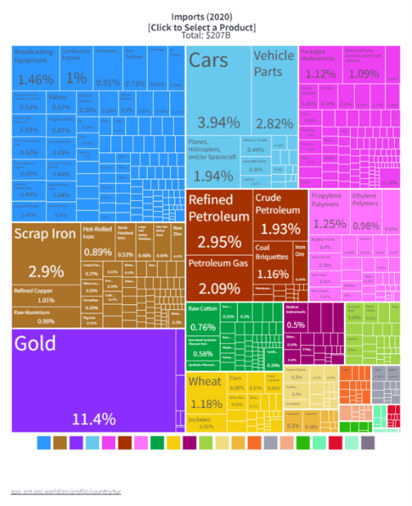
-
(Turkey’s imports volume by product in 2020)
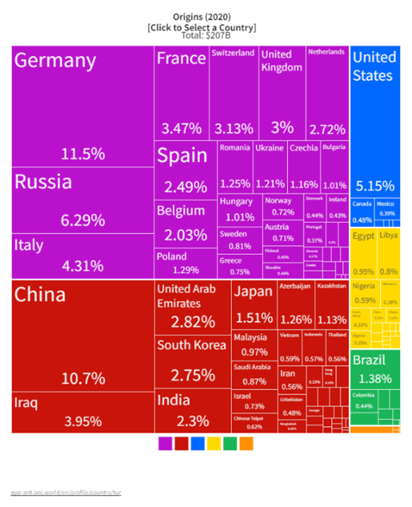
-
(Turkey’s trade volume by country in 2020 (Top: Imports, Bottom: Exports )
Source https://oec.world/en/profile/country/tur) -
//Reference//
The Ministry of Foreign Affairs HP: JETRO | Japan External Trade Organization
ーーIn such an environment, how will MOL structure its business in the future?
Katada
- Manufacturing is thriving in Turkey, and it is fair to say that there is almost nothing you can't make. However, a weak point is that they cannot add value and, in particular, unique brands have not been developed. If we can combine their strengths with the advantages of the Japanese brand power, thereby compensating for any Turkish weakness, we will be able to build a good business relationship.
Yamada
- The Turkish people have the reputation of being “tough negotiators”, nurtured through their long history of trade and building relations with neighbouring countries since the Ottoman era, making them reliable partners. They are also diligent, earnest. and full of compassion. They respect civility and do not forget favours received. I feel they have a lot in common with the Japanese with respect to these qualities. When Japanese people visit foreign countries on business, they often feel hostility, as if foreign partners are being unnecessarily competitive to further their aims, but Turkish people show none of this. They are open to all ideas and are immediately willing to build a cooperative relationship on equal footing.
Katada
- Maybe because of the prevalence of Islam there is a spirit of "Insha Allah (as God wills)". They have the willingness to try anything and are not overly concerned if it doesn't work. They have the ability to face critical situations without flinching and make decisions quickly or quickly change direction. They do tend to be focused on short-term gains and lack a long-term perspective, but if we help guide them through a project, we can be assured of getting good results.
Political instability and severe inflation in Turkey
ーーAs inflation accelerates, there are reported concerns about political instability. Is there a significant political influence on business?
Katada
- While I don't feel that many people in the business world support President Erdogan's current policies, he seems to have a high level of support from the general public. President Erdoğan has shown he has the political ability to deal on an equal footing with big names on the World stage, such as with the former President Trump and President Putin, and when taking an uncompromising stance against the EU on issues such as seabed resources and territorial seas. He has a large number of people who rely on him, and it is certain that there are still many people who support him even in the midst of the current inflation. We have no choice but to continue closely observing the situation, but we estimate things to go in a bad direction no matter what happens.
ーーTurkish cuisine is considered one of the "world's three great cuisines" along with Chinese and French cuisine as its court cuisine developed to serve dynasties and emperors over the centuries. How is your diet?
Yamada
- There are many dishes available that Japanese people would like, and indeed I like them so much that I always end up eating too much. Pork is avoided due for religious reasons, but many dishes are made using other meats, such as mutton, and the deep flavours combined with olive oil and spices are addictive. Most of the Japanese representatives here have gained some weight by the time they return to Japan, which is proof of the quality of the food here. However, I remember a meal I had at a restaurant as being particularly delicious but when I went back there half a year later the price had increased by about 1.7 times……, bringing home to me the severity of the inflation in the country.
Katada
- As for inflation, it is having a big impact on the lives of our staff here, so we respond by reviewing wages every month. If this political and economic situation took place in Japan, there would be serious repercussions, but Turkish people are generally continuing to work with a positive outlook rather than becoming pessimistic.
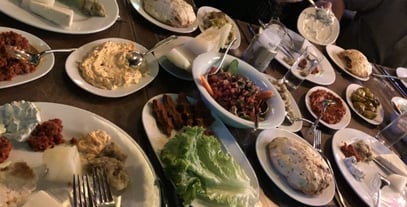
-
Meze
Traditional Turkish appetizer, choose your favourite as the chef will show you many small plates. Be careful not to eat too much and become overfull.
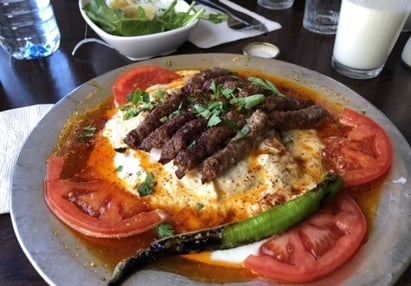 Manisa Kebab
Manisa Kebab
A kebab from the Manisa region. It has unsweetened yogurt sauce and bread underneath, which goes very well with the tomatoes and meat juice.
The Decline in Tourism and MOL’s Unexpected Initiatives
ーーWe hear that tourism, a major industry, is suffering a severe decline.
Katada
- Turkey has an active tourism industry, with 45 million foreign visitors per year in pre-COVID-19, 2019, and tourism revenues of $34.4 billion, or 4.4% of GDP. This was because the Turkish government positioned it as an important industry and focused on it, with the private and public sectors cooperating to develop resorts. However, the number of tourists decreased drastically after the end of 2019 due to the COVID-19 pandemic, and the war between Russia and the Ukraine has also had a significant impact on the number of visitors, as the number of tourists from Russia and Ukraine has fallen sharply. The lockdown in China has also exacerbated the situation.
Yamada
- There's very little our company can directly do about tourism, but there is something we're attempting in the world of shipping. The global decline in tourism has brought to a halt the number of cruise ships that were scheduled to be active. Most of these ships have been scrapped in order to avoid the huge costs of long-term berthing without knowing when they would be able to resume work. Many of these ships are coming to Turkish scrap yards, but scrapping operations are dangerous for the workers, and it is easy to scatter pollutants into the sea. For this reason, we have decided to take responsibility for the entire life cycle of the ships, ensuring the safety of scrapping ships and finding ways to recycle and reuse various parts and materials. As part of these efforts, on a newly developed website we have started to introduce and make available for purchase to ship enthusiasts some of the instruments and decorations used on these ships, along with the history of the ships. We believe this is a significant step from the perspective of SDGs, which aim to create a sustainable society. The shop website has just started, and we are working to make it more complete. We hope it attracts the interest and patronage of all shipping enthusiasts.
[Click here for the shop site]
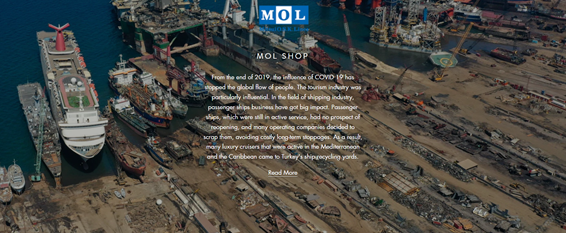

Conclusion ~ Future Challenges and Prospects ~
ーーWhat are the challenges and prospects for the future in Turkey?
Yamada
- We are now trying to further strengthen our relationship with Turkish companies based on our logistics and shipping businesses and expand our business into the markets of other countries, such as the Balkans, the Black Sea, and Central Asian countries, as well as Africa.
Katada
- We aim to expand our business not only in Turkey but also in other countries in partnership with Turkish companies. Turkish people are sufficiently aggressive to obviate the need for the word "shy", and they have a disposition to boldly try new things. I believe they will be a great driving force to us Japanese, who tend to be very cautious about everything and never take a step forward without careful planning. I also believe that we can become good partners over the long-term, building a brand power with unique qualities. With this ideal partnership between Turkey and Japan at its core, I would like to see us move into new markets soon.
ーーThank you.
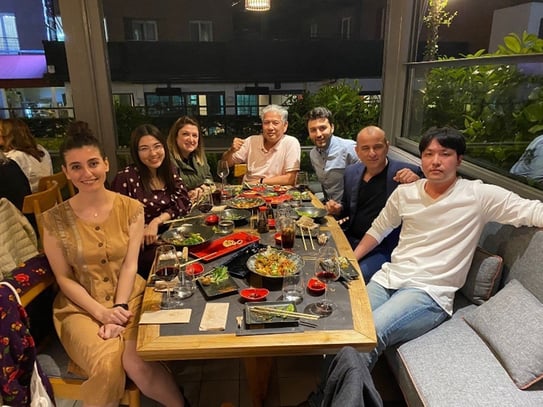
Employees of MOL TURKEY (Mr. Katada: centre, Mr. Yamada: first from right)
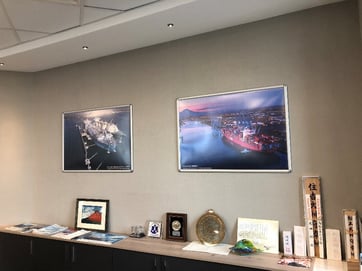
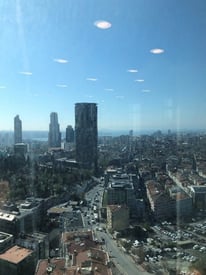
MOL Turkey Office
Left: Picture of the FSRU operating in Turkey and the safe operation talisman are displayed.
Right: Views of Istanbul from the office
[Interview]
Satoshi Katada
MOL(Turkey)Managing Director
Satoshi Katada joined MOL in 1988 and has been working in Istanbul as the representative of Turkey since 2017. He is truly a man of a hundred battles, having experienced various sales activities and the setting up and running of facilities in Asia, China, India, and the Middle East, overcoming all kinds of difficulties along the way. He continues to take a tough approach to new business, with the belief that all difficulties can be overcome.
Yosuke Yamada
Global Sales Team, Corporate Marketing Div.
Yosuke Yamada joined MOL in 2010. Based on his experience in the administration and energy transport divisions, he has been in charge of supporting the Country Representative of Turkey, Mr. Katada, in the Corporate Marketing Division since April 2021. As a key person in helping to realize the beliefs and ambitions of Mr. Katada, the representative of Turkey, he frequently travels to Turkey to advance projects. Any free time he has is spent searching for the best lokanta (restaurant) in Turkey.
Recommended Articles
2022.07.05
- General Shipping
2021.04.13
- Energy
2021.08.07
- Eco Friendly
2021.06.07
- Energy
- Eco Friendly
2021.11.16
- Eco Friendly
Latest Articles
2024.04.22
- Energy
- General Shipping
2024.04.02
- Energy
- General Shipping
2024.03.19
- Energy
- General Shipping



